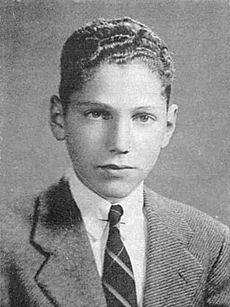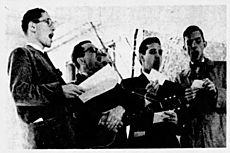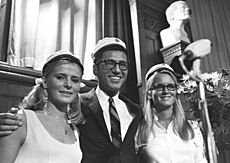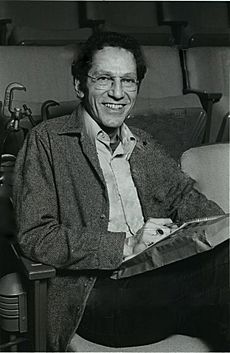Tom Lehrer facts for kids
Quick facts for kids
Tom Lehrer
|
|
|---|---|
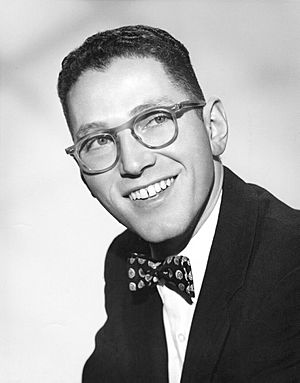
Lehrer c. 1957
|
|
| Born |
Thomas Andrew Lehrer
April 9, 1928 Manhattan, New York City, U.S.
|
| Died | July 26, 2025 (aged 97) Cambridge, Massachusetts, U.S.
|
| Education | Harvard University (AB, MA) |
| Occupation |
|
| Musical career | |
| Genres |
|
| Instruments |
|
| Years active |
|
| Labels |
|
| Associated acts | Joe Raposo |
| Signature | |
Thomas Andrew Lehrer (born April 9, 1928 – died July 26, 2025) was an American musician, songwriter, and mathematician. He was known for his funny and smart songs, which often made people think about important topics like politics and science. His songs became popular in the 1950s and 1960s.
Tom Lehrer often used humor to make fun of popular music styles. He would create new melodies or sometimes use existing ones, like in his song "The Elements." For this song, he sang the names of all the chemical elements to the tune of a famous song from the musical Pirates of Penzance.
In the 1960s, Tom Lehrer wrote many songs about current events and social issues, especially for a TV show called That Was the Week That Was. These songs were so well-written that they remained popular long after the events they talked about. Later, in the 1970s, Lehrer mostly stopped performing in public. He chose to spend his time teaching mathematics and the history of musical theater at the University of California, Santa Cruz.
Contents
Early Life and Education
Thomas Andrew Lehrer was born in New York City on April 9, 1928. He grew up in Manhattan. From a young age, he started learning to play the piano. He was very interested in the popular music of his time. He even began writing his own songs, which helped him later when he became a satirical composer and writer.
Tom Lehrer was a very bright student and skipped two grades in school. When he was just 15 years old, he started attending Harvard College. While at Harvard, he began writing funny songs to entertain his friends. One of these songs was "Fight Fiercely, Harvard." These early songs were sometimes called the "Physical Revue," a playful nod to a science journal.
Academic and Military Career
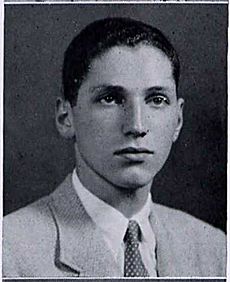
Tom Lehrer earned his Bachelor of Arts degree in mathematics from Harvard University in 1946. He then received his Master of Arts degree the following year. He went on to teach mathematics at several well-known universities, including MIT, Harvard, Wellesley, and the University of California, Santa Cruz.
In 1955, Lehrer joined the U.S. Army and served until 1957. During this time, he worked at the National Security Agency (NSA). He later shared that the NSA's existence was a secret back then, so he had to pretend he was working on nuclear weapons as a cover story. His experiences in the army even inspired some of his songs, like "The Wild West is Where I Want to Be."
In 1972, Lehrer became a professor at the University of California, Santa Cruz. He taught a course called "The Nature of Mathematics" for students who were not math majors. He also taught a class about musical theater. Sometimes, he would even sing his songs during his lectures!
Tom Lehrer taught his last math class in 2001 and then retired from teaching.
Musical Career Highlights
Style and Influences
| When You Are Old and Gray | |
|---|---|
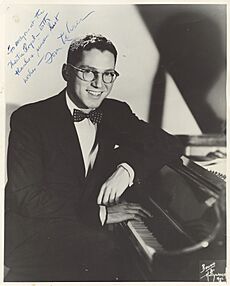
Lehrer c. 1958
|
Tom Lehrer was greatly inspired by musical theater. He loved to create songs that made fun of different popular music styles. For example, he enjoyed "list songs," which are songs that list many things. This led him to write "The Elements," where he listed all the chemical elements.
A famous writer, Isaac Asimov, once saw Lehrer perform in 1954. Asimov remembered a song where Lehrer cleverly talked about many different unusual situations without using any rude words. He also recalled a song about the Boston subway system, which was very funny for people who knew the area.
Recordings and Early Success
| We Will All Go Together When We Go | |
|---|---|
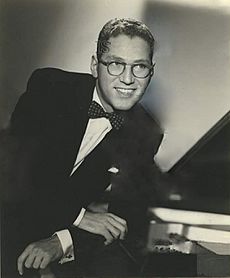
Lehrer c. 1958
|
Because his live performances were so popular, Tom Lehrer decided to record his songs. In 1953, he recorded his first album, Songs by Tom Lehrer. He paid for it himself and initially pressed only 400 copies. Radio stations wouldn't play his songs because some topics were considered unusual. So, he sold the album on his college campus.
Word of mouth helped his music spread. People would play his records for their friends, and soon, he was getting orders from all over the country. Lehrer joked that his songs spread "slowly," like a secret shared among friends.
His first album included songs like "I Hold Your Hand in Mine" and "Lobachevsky," which was about mathematicians who copied others' work. It became very popular, even without much advertising.
In 1959, he released two more albums: More of Tom Lehrer (a studio recording) and An Evening Wasted with Tom Lehrer (recorded live). He once shared a funny story about recording "Poisoning Pigeons in the Park." The musicians playing with him didn't know the song's title or lyrics until the recording started. When the engineer announced the song, the piano player was so surprised he almost fell off his stool!
International Tours and TV Work
Tom Lehrer became very popular in the United Kingdom in 1957. This happened after a professor mentioned his songs during a speech for Princess Margaret. This made many people curious about his music. Even though the BBC banned 10 of his 12 songs from being played on the radio in 1958, his music still sold very well. By the end of the 1950s, he had sold 370,000 records!
In 1960, Lehrer toured Australia and New Zealand. He performed many concerts, which were very popular but also caused some discussion. He even wrote songs criticizing a rugby tour to South Africa during a time of unfair racial separation. Lehrer said that during his tours, he was sometimes "banned" or "censored."
In the early 1960s, Tom Lehrer became the main songwriter for the American TV show That Was The Week That Was (TW3). This show was known for its funny and sometimes sharp commentary on current events.
| National Brotherhood Week | |
|---|---|
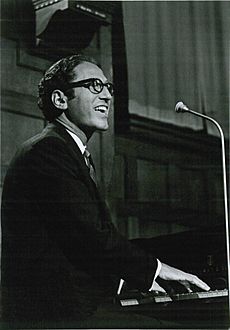
Lehrer performing in Copenhagen, 1967
|
Many of his songs for this show were about important topics of the time. He wrote about new ways of teaching math ("New Math"), religious changes ("The Vatican Rag"), how people of different races got along ("National Brotherhood Week"), and even pollution ("Pollution"). He also wrote songs about military topics and the spread of nuclear weapons. One famous song made fun of a rocket scientist named Wernher von Braun.
Tom Lehrer himself didn't appear on TW3. Other singers performed his songs. Later, he performed nine of these songs at a nightclub, and they were released on an album called That Was the Year That Was (1965). This album became very successful, selling over 1.8 million copies by 1996.
Retirement from Performing
| L-Y | |
|---|---|
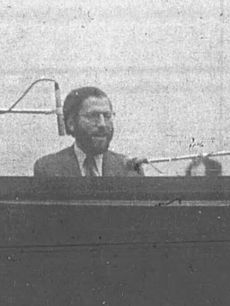
Lehrer performing at a fundraising event for George McGovern in Brattleboro, Vermont, 1972
|
In the 1970s, Tom Lehrer decided to focus more on teaching mathematics and musical theater. He also wrote ten songs for a children's educational TV show called The Electric Company. His last public performance for many years was in 1972, during a fundraising event for a political candidate.
When asked why he stopped his musical career, Lehrer joked that he enjoyed high school but wouldn't want to do it again. He meant that he enjoyed making music, but he felt he had done enough.
Even though Tom Lehrer supported peace and fairness, and his songs often talked about these ideas, he didn't like the style of the youth movements in the 1960s. So, he stopped performing as those movements grew.
His musical career was quite short. He performed only about 109 shows and wrote 37 songs over 20 years. But his music gained a large and loyal following around the world.
Later Revivals and Public Domain
In 1980, a musical show called Tomfoolery was created, featuring many of Lehrer's songs. It was a big hit in London and later in New York. Tom Lehrer was happy with the show and even updated some of his song lyrics for it.
In 1998, Tom Lehrer performed in public for the first time in 18 years as part of a special show in London. He sang "Poisoning Pigeons in the Park" and an updated version of his song about nuclear weapons.
In 2000, a collection of his songs called The Remains of Tom Lehrer was released. It included many of his recordings, some new material, and a book of lyrics. In 2010, more of his albums were re-released digitally.
In October 2020, Tom Lehrer made all the music and lyrics he had ever written available to everyone for free. This means anyone can use his songs without needing special permission. In November 2022, he officially gave up his copyright to his songs. He also created a website where people could download all his recordings and song lyrics for free. He mentioned that the website would not be online forever, so people should download what they wanted soon. As of July 2025, the website is still available.
Musical Legacy
Many artists have been inspired by Tom Lehrer's unique style. The famous composer Randy Newman said that Lehrer was "one of the great American songwriters." Singer "Weird Al" Yankovic, known for his funny parody songs, also looks up to Lehrer.
A play called Letters from Lehrer was created in 2006, which explored Lehrer's musical journey and the meaning behind his songs. In 2024, another play, Tom Lehrer Is Teaching Math and Doesn't Want to Talk to You, was performed, featuring his music.
Tom Lehrer is often called the "King of Satire" by his fans because of his clever and humorous songs.
Discography
Studio albums
- Songs by Tom Lehrer (1953), re-recorded in 1966
- More of Tom Lehrer (1959)
Live albums
- An Evening Wasted with Tom Lehrer (1959)
- Revisited (1960)
- That Was the Year That Was (1965)
Compilation albums
- Tom Lehrer in Concert (1994; UK compilation)
- Songs & More Songs by Tom Lehrer (1997; US compilation of his first two studio albums with additional songs)
- The Remains of Tom Lehrer (2000)
- The Tom Lehrer Collection (2010)
- The Conducted Tom Lehrer (2023; Adds instrumental versions of four songs, with an additional song, 'Trees', that was previously unreleased)
Singles
- "(I’m Spending) Hanukkah in Santa Monica"/"A Christmas Carol" (Stand Up! Records, 2024)
Sheet music for many of Lehrer's songs was published in The Tom Lehrer Song Book (1954) and Too Many Songs by Tom Lehrer (1981).
Publications
Two of Lehrer's songs were printed in Mad magazine:
- Tom Lehrer Sings "The Wild West is Where I Want To Be" (illustrated by George Woodbridge, MAD #32, April 1957)
- Tom Lehrer's "The Hunting Song" (illustrated by George Woodbridge, MAD #35, October 1957)
See also
 In Spanish: Tom Lehrer para niños
In Spanish: Tom Lehrer para niños
 | Frances Mary Albrier |
 | Whitney Young |
 | Muhammad Ali |


